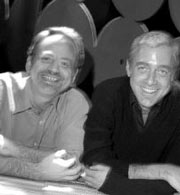HAIRSPRAY
The 5th Avenue, 1308 Fifth, 292-ARTS, $16-$58 7:30 p.m. Sun. and Tues.-Thurs.; 8 p.m. Fri.-Sat.; 2 p.m. matinees Sat.-Sun. previews begin Thurs., May 30 runs Fri., June 14-Sun., June 23
MARC SHAIMAN and Scott Wittman could be Ernie and Bert. Partners in both life and work, the songmen look the part of television’s most famous sexually ambiguous buddies: Shaiman is shorter and more casual, with a round face and an ear-to-ear smile; Wittman is the elongated guy who seems likely to put a damper on the fun. Thankfully, though, they’re both Ernie—playfully snickering at the mischief they’ve been allowed to cause: turning a John Waters film into a musical.
“The only thing that would have made us happier,” says Wittman, “is if [we’d been asked] to make a musical out of Female Trouble.“
Now that would be one for the whole family—the tale of a girl who goes on a killing spree because her parents won’t supply her with a pair of “cha cha heels.” But composer/lyricist Shaiman and co-lyricist Wittman were thrilled enough to be handed the task of scoring Hairspray, a more mainstream but no less cheekily subversive Waters comedy about big-haired, big Baltimore girl Tracy Turnblad, who desegregates and musically radicalizes a popular local TV dance show in the early ’60s. The guys are disarmingly ecstatic about the show, which has been in the workshop stage—just a rehearsal piano and a bunch of game actors—for about three years and makes its world premiere in Seattle with book by Mark O’Donnell and Tony-winning Producers scribe Thomas Meehan. They discuss it like a couple of kids, finishing each other’s thoughts, genuinely bowled over that something on which they’ve worked so hard is coming to life right in front of them.
“This has been a dream of ours,” Wittman acknowledges.
That wish may have come true, but you have to wonder if it was a bit of a challenge putting a cult filmmaker’s gleeful trash sensibility into a big Broadway musical without losing his spark.
“We don’t even have to think about how to retain [it],” Shaiman says. “That’s just the way we are.”
He’s right. In a theater world that has A Chorus Line‘s Marvin Hamlisch trying to musicalize the biting language of the 1957 film The Sweet Smell of Success, for once someone got it right. Wittman and Shaiman have brass and irreverence all over their r鳵m鳺 Shaiman, a respected Hollywood composer (Sleepless in Seattle), is a longtime arranger and musical director for Bette Midler, among other larger-than-life personalities (Raquel Welch!), and co-wrote the hilarious songs for South Park: Bigger, Longer & Uncut; Wittman, too, has had his share of divas (even directing drag c鬨bre Lypsinka) and has written material for Howard Stern and Martin Short. Together, they cut their stage teeth as East Village madmen in the early ’80s, conceiving howling spoofs for the intimate Club 57 (their celebration of The Sound of Music found ex-Warhol superstar Holly Woodlawn damning those days “when the dog bites/when my pee stings”).
Oh, but don’t call Hairspray camp.
“We’re not allowed to use the word ‘camp,'” Shaiman jokes. “It seems to be a code word for ‘gay.'”
“So that big pink set—don’t talk about it,” Wittman laughs, referring to the eye-popping, candy-colored backdrops that would look right at home in an old Warner Bros. cartoon.
“For us, [camp] just means fabulous and colorful,” says Shaiman.
And, he adds, no one’s out to alienate anybody with nudging insider humor.
“I think that what [people] fear,” says Shaiman, “is that it will only be knowing, winking jokes. But we love the characters.”
ONE OF THOSE characters is Tracy’s mother, Edna, a force of nature played by Waters’ drag inspiration Divine in the movie and essayed here by Torch Song Trilogy‘s Harvey Fierstein. Ironically, Waters, who has given complete support throughout the process—”He’s like a fairy godfather,” Wittman smiles—originally didn’t think the stage character should be played by a man. According to Wittman, the inimitable filmmaker said, “If it’s gonna be a man, I think it should be Anthony Hopkins.”
The mention of Waters brings up another question: How much interference from outside moneymen have these guys had, considering Waters’ un-P.C. tendency to lampoon all of humanity? Surprisingly little, they say, with a few exceptions.
“We had an Anne Frank joke that they respectfully asked us to remove,” Shaiman recalls.
“We can make fun of fat people and black people, but Anne Frank is still touchy,” says Wittman.
They like to laugh about the project, but the duo is quick to note that the show was shaped with care. They admire the unironic commitment with which Fierstein is playing his female role, and, they say, they’ve given the show a real musical journey (fluffy Phil Spector-ish girl-group tunes morph into a true Detroit sound once Tracy is liberated) and an honest treatment of Waters’ furtive social concerns.
“It’s about the outsider,” Shaiman says. “The people who don’t color inside the lines. Which is what John is.”
Black characters, whose style and music transform Tracy, gave the team the challenge of carefully researching language and attitudes of the period (the pair said they and the cast had a lot of fun with a book on African-American lingo called Black Talk).
“We didn’t want it to be the white guy, Jewish version of black people,” Shaiman explains.
“Even though we wrote a lot of the score in a beach house in Laguna over martinis,” Wittman deadpans.
Most important for them, though, is the idea of success for something so singular.
“We want this to be a big hit,” Shaiman says, as Wittman nods. “We want the satisfaction of bringing John Waters to Broadway.”








